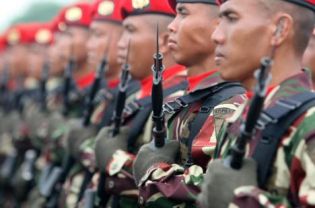 Reports that Jakarta threatened to derail US President Barack Obama’s visit to the country unless the ban on military training for the Indonesian special forces was lifted have been denied by the government.
Reports that Jakarta threatened to derail US President Barack Obama’s visit to the country unless the ban on military training for the Indonesian special forces was lifted have been denied by the government.Based on US diplomatic cables made available by WikiLeaks, the Melbourne Age newspaper reported that President Susilo Bambang Yudhoyono privately told US officials the training ban was the “litmus test” of ties between the United States and Indonesia.
The ban was imposed in 1999 because of a long record of human rights abuses attributed to the special forces, or Kopassus, including killings in East Timor and Papua.
“President Yudhoyono and other senior Indonesian officials have made it clear to us that SBY views the issue of Army Special Forces training as a litmus test of the bilateral relationship and that he believes the … visit of President Obama will not be successful unless this issue is resolved in advance of the visit,” the US cable reportedly said.
Six months after the January cable, the United States agreed to resume ties with Kopassus, despite objections from human rights groups.
In July, US Defense Secretary Robert Gates said the United States felt the time had come to renew links with Kopassus “as a result of Indonesian military reforms over the past decade, the ongoing professionalization of the TNI and recent actions taken by the Ministry of Defense to address human rights issues.”
Leaked cable correspondence reveals that US diplomats in Jakarta believed Yudhoyono’s demands needed to be met to ensure that Indonesia’s military would protect US interests in the region, including cooperation in the war on terror. The diplomats argued that closer ties would lead to greater reform in the Indonesian military.
“There is no such thing, really there is nothing [to the reports],” Defense Minister Purnomo Yusgiantoro said of the report before a cabinet meeting at the presidential palace.
“In the agreement that we signed [on ties with Kopassus], Indonesia and the US had the same position. We did not force them,” he added.
Presidential spokesman Teuku Faizasyah also dismissed the matter. “We don’t want to respond to whatever WikiLeaks says from time to time,” he said. “First of all, what the cables say does not make any sense.”
In other reports, US officials also expressed concern over Indonesia’s failure to successfully prosecute soldiers accused of torture and murder during the conflicts in East Timor and Aceh.
In October 2007, the embassy told Washington in a cable that “Indonesia has not prosecuted past human rights violations in any consistent manner.”
Another cable cited by The Age noted that around the same time, several high-ranking Indonesian officers had been promoted, despite questions about their involvement in past atrocities.
The cable said Indonesian military reforms were encouraging, but noted they were not “the same as putting generals behind bars for past human rights abuses.”
There are reportedly around 3,000 leaked US diplomatic cables involving Indonesia waiting to be released by WikiLeaks. Friday’s report in The Age is one of the first involving those cables.
